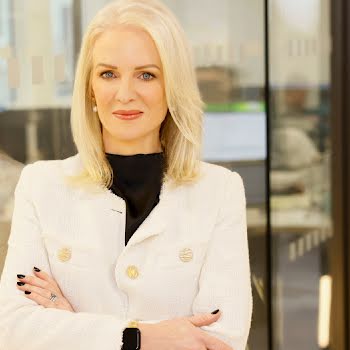

Having recently attended a fascinating talk given by renowned futurist Gerd Leonhard, Lizzie Gore-Grimes reports on the key takeaways, his AI predictions and the new skills that will be valued in the future.
When we think of “robot learning”, many of us have watched too many movies where the big, bad computer takes over the world. I’m showing my age here, but 1983’s WarGames where a teenage Matthew Broderick has to trick the military supercomputer into playing Tic-Tac-Toe with itself to prevent World War III, certainly made an impression on me as a kid. It, like countless movies and books, plays into the (very real) human fear that computers, if “superpowered” enough, could take over the world and destroy humanity.
Listening to Gerd Leonhard speak at a recent event hosted by Samsung, he is quick to put computers in their place. “Machines are competent,” he states, “but they are not conscious”.

Complex nuance
“AI is here to support us, to help with the mundane tasks, so that we can focus on the more rewarding stuff. Ideally, it should allow us to take back the time to do the things we genuinely love and enjoy.”
At “Galaxy Gazing: The Future of Al with Renowned Futurist Gerd Leonhard”, he goes on to clarify that ‘Artificial Intelligence’ is not really the right term, as ‘Intelligence’ is about so much more than mere book facts and rote learning; a computer works on hard facts and formulas – it “computes” it does not “think”. When humans think and make decisions we bring all of our life experience to date into play, as we ponder, ruminate and weigh up one argument against the other.
It’s this “complex nuance” of human understanding that Gerd explains cannot be replicated by a computer programme (yet!). “The machine only sees 5% of real life. Human judgement is critical to see the full picture.”
We like Google Maps but when it tells us to drive through Temple Bar at rush hour, we question it. He’s right, it suggests a route, but we live in the city, we will review the suggested route and make an informed decision to follow its lead or not.
The purpose revolution
Gerd goes on to introduce us to the three most recent revolutions: The Digital Revolution (this has already occurred as we all walk around with the internet in our pocket); The Sustainability Revolution is currently in full force; and The Purpose Revolution is next.
“My generation was all about prosperity,” admits Gerd, a six-foot-something, very impressive looking 63-year-old. “In our quest for same [prosperity], we added a whopping 50% to the planet’s emissions. Today’s Millennials and Gen Z are fixing this, they are passionate about sustainability… and purpose.
“My generation lives to work; but the next generation works and lives, with a much greater emphasis placed on the living part – purpose-filled living.”
This is where AI can be great. Ideally, with the help of AI, in the role of admin assistant, we can work fewer hours in the week, leaving us more time for our lives.
AI as a power tool
If you want to build a shed in your back garden – you can absolutely do so with a hammer, a saw and some nails. But how long will that take? Compare it to doing the same project with the assistance of a power saw and a nail gun. You would cut the labour effort and time in half, if not more.
“AI can be this power tool,” states Gerd. “[It can] reduce our time and effort spent on mundane tasks, but like any power tool it must be handled with care – this is where human judgement and regulation are crucial.”
Like so many things in life, too much of a good thing can be bad. Take ice cream or alcohol – great in moderation; lethal if misused. AI is much the same. We need to use it mindfully and carefully.
“Computers don’t have understanding but they do have knowledge in the form of data,” continues Gerd. “So, if you work like a robot, (repetitive, predictive tasks) [the] chances are a robot will soon be doing your job. And, similarly, if you study like a robot, chances are you will not have a job in the future.”
“The machine only sees 5% of real life. Human judgement is critical to see the full picture.”
The future is HECI
This means that as machines and technology continue to develop, the core traits that make us human – our emotion, creativity, imagination, ethics, empathy, mystery, compassion and intuition – will soar in value because they cannot be replicated by a machine.
In recent decades we have seen STEM skills and professions highly prized. Fascinatingly, Gerd predicts HECI skills and professions will be most prized in the decades to come. HECI stands for: Humanity, Ethics, Creativity, Imagination.
“I believe that HECI skills must be the core of educational systems, going forward. If you want your kids to be successful in the future, teach them to be MORE HUMAN (not less)!”
Nicely put Gerd.
I have to say I was surprised to walk away from the talk feeling optimistic and buoyed up. But then perhaps that is my own personal bias at play – as someone who personally values HECI skills very highly, the idea that they are set to become even more important in the future is music to my ears.
Gerd’s top tips for future success
- Expand and develop your own human-only traits and skills
- Use the tech – do not become the tech
- AI is a power tool – use it with care
- Keep the humans in the loop – always

GerdBot, what new roles and job titles do you predict in the future?
I visited futuristgerd.com, to ask Gerd’s very own AI-enhanced GerdBot a question
Based on the insights provided by Gerd Leonhard in the context of changing job titles and roles in the future of Human Capital, it is evident that traditional job titles are becoming less relevant.
Instead, companies are focusing more on competencies such as speed of learning, adaptability, and resilience when recruiting talent. This shift indicates a move towards a more personalised and skills-based approach to defining roles within organisations.
As the working environment continues to evolve rapidly, job titles and descriptions are expected to become less standardised and more tailored to individual capabilities and responsibilities. The emphasis is shifting towards skills, productivity, and delivery rather than rigid labelling based on job titles alone.
This trend reflects a richer tapestry of responsibilities within organisations where employees may have diverse skill sets that cannot be encapsulated in a simple three-word job title. Furthermore, with the rise of technology revolutionising work processes, there is an increasing need for specific skills such as technological know-how, problem-solving abilities, critical thinking, perseverance, collaboration, and empathy. The gig economy is also reshaping the way people work by promoting lifelong learning and multiple career experiences over time.
In conclusion, Gerd Leonhard’s perspective suggests that the future of Human Capital will involve roles that prioritise competencies over traditional job titles. Employees will need to possess a diverse set of skills to thrive in an ever-changing work landscape where adaptability and continuous learning are key factors for success.
Learn more about the Samsung Galaxy Fold 6 in-store or online.



















